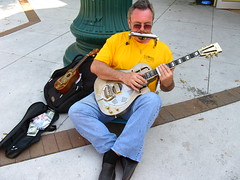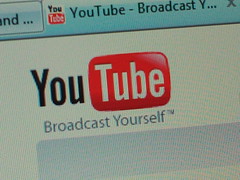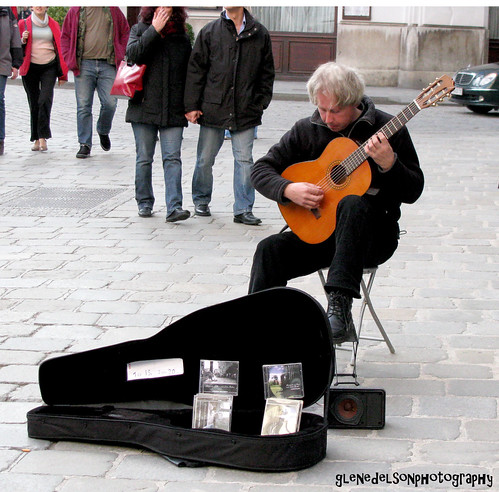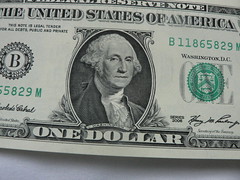 March 7, 2011
March 7, 2011 Want To Make $50,000 a Year In Music? Start With One Dollar a Day.
A big part of my blog, How To Run A Band, is to figure out how to actually make money with music. However, I’ve been talking about giving music away for free, buying fancy tablets, and paying for web hosting. If you look at my “financials” page, you’ll notice a downward trend in money for my guinea pig band Shiplosion.
How does a musician make money? Honestly, I don’t know for certain. But, I think I have a couple of ideas. However, these ideas are based more on the individual musician, and not the band as a whole. Why? The individual can make more money and have more control over their finances than an entire band.
Start Earning One Dollar A Day
Every day, grab an acoustic guitar and head down to the street corner. Start playing songs and singing with the case open to take tips. Don’t stop until you have at least one dollar.
There you go. $365 for the year.
Are you a drummer? Grab some drums and set up shop on that street corner. I’ve seen kids playing with buckets busking for money. There’s no reason a drummer with a minimal drum kit can’t do the same. (Even though we all know drummers are “special”…)
“$365 a year? That sucks!”, you say.
Yep, that does suck. But that’s $365 more a year than you were previously earning. Being in a band over a 6 year period, I’ve lost way more than $365. Busking every day will earn you more than my band that was playing multiple cities in multiple states 3 days a week for 6 years.
But earning a dollar a day is not the end goal. Once you can successfully earn one dollar a day, how much effort will it take to get to $2 a day? Maybe busk at one additional location? Do some cover tunes? Play for 30 more minutes?
“But I feel like a hippy dumbass. Isn’t this for homeless drug users and not the awesome caliber of musician that I am?”, you ask. (Okay, I asked but pretended it was you.)
If you don’t feel comfortable doing something, don’t do it. However, there’s money on the table that you are ignoring. If you are on tour, busking could be the deciding factor for being able to afford dinner or gas money. Or, more importantly, beer money.
Busking also gives you the coldest, most disinterested crowd on Earth. What better way to learn how to be positive and entertaining regardless of the situation? And if you think you are too great of a musician to resort to busking, I’d say it’s about time you learned some humility. If you’re not completely self-sufficient as a musician, there is plenty of humility yet to be had.
Sweeten The Deal
 Photo by Clyde Robinson You are now comfortably earning a couple of dollars a day. Now it’s time to turn it up a notch. Create an acoustic CD to sell with your busking.
Photo by Clyde Robinson You are now comfortably earning a couple of dollars a day. Now it’s time to turn it up a notch. Create an acoustic CD to sell with your busking.
Don’t go crazy on this. In fact, I’d argue you record, mix, and master it yourself. As cheaply as possible. Your busking isn’t your main musical career, but an additional revenue source. Use CDBaby to print out a limited run of CDs.
With the addition of CD sales, you are now making $5 to $10 a day. You also have an extra CD to add to the merch booth of your main band.
See the pattern?
Start small and constantly add value and content. Don’t overlook small price points. 25 cents from a few thousand people adds up. There is no purchase too small.
Do it every day. Daily. Every day is an opportunity. It’s yours to have or not.
YouTube Busking
 Photo by codenamecueballPhysically busking in one area is limited to only that one city and the people only walking by at that particular time. YouTube is global and timeless. Record yourself playing your music daily and throw it out to the world on YouTube. Hell, record yourself while you’re busking on the street.
Photo by codenamecueballPhysically busking in one area is limited to only that one city and the people only walking by at that particular time. YouTube is global and timeless. Record yourself playing your music daily and throw it out to the world on YouTube. Hell, record yourself while you’re busking on the street.
At the end of your YouTube busking, add a call to action. Give a link to your website and ask for 25 cents. On your site, provide people a way to donate a small amount of money to you. PayPal has options for micro transactions. Use it! The good ol’ long tail theory could net you a bit of cash over the life of this YouTube post.
On top of the daily busking, this additional outlet “could” provide additional revenue. It’s not guaranteed it will, though, so be prepared. However, make your videos interesting enough, you can gain a large following. At that point, you can become a “YouTube Partner” and earn money through ads.
Breaking Down The Numbers
So, doing the above, you’re going to be earning about $5 to $10 a day. You’re going to bitch and whine that that’s impossible to live off of. What you’re not realizing is that I just taught you how to make around $1825 to $3650 extra a year on your music.
It’s not glamorous. It’s not sexy. But it’s money in your pocket.
But, I know you are not satisfied. You want to quit your job. I’m with you on this. I wish I could quit mine. I’m not there yet. However, we need to know the numbers that we need to achieve to quit our day jobs. For me, I’d like $50,000 a year. I’ll use this number to calculate what it would take to be a financially independent musician.
$50,000 divided by 365 days = $137 a day.
That’s it. Earn $137 a day, and you can quit your day job. You are a fraction of the way there using the above techniques, but you will definitely need more money per day to accomplish this task. This figure shows why you can’t entirely rely on your band by itself to generate the income you need.
Your Band Won’t Make The Dough
This point I know you will rail against. “My band will make it! We will become famous.” That’s your ego talking and not your brain. Your band will most likely, by itself, not produce the money you need to get by.
 Photo by Jason A. White I was following one of the members of GWAR on Twitter. I was surprised to find that he is a bartender after the GWAR tours end. GWAR packs an awesome crowd at venues and has been doing so for 25 years. Still…bartender. One of his tweets was “I always wanted to be rich and famous. I have one of the two.”
Photo by Jason A. White I was following one of the members of GWAR on Twitter. I was surprised to find that he is a bartender after the GWAR tours end. GWAR packs an awesome crowd at venues and has been doing so for 25 years. Still…bartender. One of his tweets was “I always wanted to be rich and famous. I have one of the two.”
Here’s the breakdown. Let’s say your band plays every weekend, twice a week. That’s 104 shows a year. For you, personally, to make $50,000 a year, you’d need to make $481 a show. Now add your band mates that also want to make $50,000 a year. Total, the band would need to make $1924 a show. Yikes!
Even if you played every day of the year, your band would need to profit $548 per show for everyone to get paid. For every additional person in your band, that is another multiplier to the base salary and profit considerations. That 8 piece Ska band doesn’t sound so thrilling now, does it?
The point is, relying solely on your band to make you a financially independent musician is not feasible. The band is just one more revenue source for you. You need multiple, musical revenue sources to get where you need to be.
You Are Your Own Income Stream
On nights your band isn’t playing, you could hit up open mic nights. Bring your CDs along. Perform and sell. Give lessons for your instrument. I think the going rate for a half hour lesson is about $30. Giving a lesson a day at this price will get you over $10,000 a year. Add the busking, and you are approaching $14,000 a year.
Exclusive Merchandise
Instead of all this daily working, what if you had some merchandise to sell that could do the trick? Easy. Get 365 avid fans. For them, make 365 items that cost $137. These items should be limited edition and never, ever hit the market again. There’s your $50,000.
Fan Base
Or, in the above example, just get 365 fans that are willing to pay $137 on you over the course of a year. Expand that to the popular 1000 True Fans model, and you would need to have each fan pay $50 a year. Do you have $50 worth of content, merchandise, or shows for the year?
This is why growing your e-mail list and treating e-mail like money is so important. Giving away a free CD for an e-mail can net you a positive income flow over a few year period. That network of fans can give you what you need to be successful. If you can grow that e-mail list to 50,000 people, all you would need is $1 a year from each person to quit that day job.
Exhaust All Possibilities
Busking. YouTubing. Lessons. What else can you do? Guitar tabs for 99 cents. Adsense for your free songs. PayPal donations.
What else? Do you have ideas on what can generate money on a daily basis? I think my ideas above could get an artist up to $10,000 a year. What would push it to $50,000?
—
(Chris “Seth” Jackson writes for How To Run A Band. A site dedicated to performing real life experiments with music marketing using a real band.)
 Selling Your Music tagged
Selling Your Music tagged  Income,
Income,  musician
musician 







Reader Comments (16)
Great post. Challenge yourself to look at other ways to make money besides selling music. Be sure to listen to what kind of merchandise your fans want and deliver it. It is not about what kind of shirt you want to wear, it is what kind of shirt they will buy.
Thanks, Michael. I agree, and that's why I love Martin Atkin's books. He says to learn to screen print so you can test what shirts will sell best before mass ordering.
Also, if the lyrics of your chorus don't look good on a shirt, you might want to reconsider the chorus. Haha! I love that one.
I've definitely failed to stack up enough merchandise in my last band. I'm not going to repeat that mistake. CDs, DVDs, t-shirts, hoodies, etc. Constantly have something new.
Actually, it's not $365 you weren't making otherwise, because there's costs associated with getting it. The average person who goes out and does that will be faced with a net loss. Not factoring in real costs allows a lot of musicians to delude themselves into thinking they're "making money." Every day is expensive, it costs money to be here on this planet.
I've used a similar approach to develop business plans and financial projections for artists. I start with how much money we want to generate annually and then work backward to calculate how that money is going to be generated. And I have done it in two ways and the numbers have been comparable either way:
1. Fan spending. How many fans do we need spending at least $100 a year? How many fans do we need spending at least $20 a year? How many fans do we need spending $10 a year? I make the assumption that the $100 a year fans are the smallest category and the $10 a year fans are the biggest category. Maybe a ratio of 10%/30%/60% (10% of fans spending at least $100 a year; 30% of fans spending at least $20 a year; 60% of fans spending at least $10). Then I look at all the potential ways they might spend their money. $10 a year is just one ticket or one album. $20 is an album and a show, or a T-shirt. $100 is coming to several shows and also buying whatever the artist and band put out each year.
2. Monthly income. I also look at how much income we want to generate per month and how that might be accomplished. How many gigs per year do we need to do to reach the necessary number of paying fans? Do we play fewer gigs reaching more fans or lots of gigs reaching fewer fans each?
I also keep track of what percentage of the audience actually spends money. How many fans per show will buy a CD, for example. If you keep track of this for several years, you can generate some fairly reliable figures on conversion rates so you know many people you have to be heard by in order to generate the necessary monthly or annual income. For example, you may actually have to be heard by 100,000 fans to get money from 10,000 of them. It's not consistent across all bands/artists so you need to learn spending patterns of the audiences for each artist/band.
What is good about this sort of approach is that it is definable and also forces you to get realistic. If you are a band that wants to play full-time, you'll likely need a minimum of $120,000 a year for a four-piece. That's $20,000 to $25,000 per band member, with whatever is left going to staff and expenses. Can your band generate $10,000 a month? Are you planning to generate it via T-shirts? If you sell $20 T-shirts as your primary source of income, that's 500 T-shirts a month, or 125 T-shirts each weekend.
This post is amazing. You honestly opened my eyes on something. I'm in a band and I've been thinking on playing by myself from time to time... since at least 2 years, and I'm still not doing it. Now this is on my top priorities list. Thank you.
@Suzanne: The one element I didn't cover in my post is costs for being in a band. Gas, strings, recording, etc. Those amounts can be staggering as well. I wanted to keep things simple, thus a simple CD, some busking, and using YouTube are a couple of low cost ways of generating cash on the side. (I'm still experimenting, so I'm sure there's quite a few ways.)
It just sucks that it can sometimes take years before a band sees profit at all.
Thank you, krapo! There was a previous post by MTT that really got me thinking about monetizing yourself as a musician, not just the band. Seven Rules for Effective Social Networking by J. Michael Epstein. Though the title seems like a simple seven stepper, the content itself is inspiring. I highly recommend this read!
Busking.
'Easy. Get 365 avid fans'
'just get 365 fans that are willing to pay $137 on you over the course of a year'
That's whole lot less typing.
@Justin. Other than changing strings, what's the extra cost? I've busked before and strings were the only expense. The only time I paid money was $12 a year performer's fee at the local Public Market. Otherwise, I got money for smokes, beer, and food. (And I wasn't that good.)
@Tim. Damn. You're right. I'll try lesser next time.
Here's the logic behind my strange comment. Many people reading this actually pay for their own lives, which can be quite expensive in this country. This is usually referred to in business circles as "overhead expenses." A hypothetical breakdown goes like this...
If you're living in an urban area, you're probably paying at least $500 a month in "rent," a regular payment in exchange for having your own space. Locating your living space also comes with upfront costs in the form of a security deposit, at least an additional $500. Rent very seldom includes the additional bills your Mom is currently covering, but for the sake of the cheapest possible argument, let's assume the only additional bill you need to cover is electricity, which runs between $30 and $100 a month depending upon the season. So far, we're up to $7,280 in expenses and there's no guitar strings involved yet -- no "food," either.
Assuming a steady diet of wonderbread, oatmeal and Ramen, you can keep your food expenses to $150 per month, which brings us up to over $9000. Breaking $10,000 is as simple as assuming you've got a monthly "discretionary spending" budget of $83. That's admission to shows, riding public transportation, getting cabs, taking "women" on "dates," and yes, guitar strings.
So given this Spartan budget, you need to be making $833 per month on busking, just to break even. Breaking even means you've "made" exactly zero dollars and zero cents.
Of course, the good news is, that means you've only got to make $28 every single day you're busking, no days off ever.
Anyone who wants to do music for a living needs to get familiar with real expenses. Fortunately, reality does that for you eventually. Opportunities come with costs. Even sitting at home doing nothing has a cost, in real U$ dollars.
I agree with the spirit of this post -- find opportunities wherever you can, establish multiple streams of income, do as much solo work as possible to cut expenses and maximize earnings, and hustle your music every single day.
But like I said: Not factoring in real costs allows a lot of musicians to delude themselves into thinking they're "making money."
@Justin. Oh, gotcha. Yeah, with the $1 a day only, you will die on the streets, poor and miserable. Only $1 a day wouldn't pay for my bass strings ($25/mth). I wrote this article with the goal of trying to quit my day job. $50,000 would just cover my debt and monthly expenses.
The main point of this article is that there could be something that could be done daily to earn extra money besides waiting for your weekend gig. It doesn't have to be busking, but busking was the only thing I could think of that you could grab a guitar, hit the street, and do right now.
I think this is a great article! Sure there are those who will look at everything with the "glass half empty" view, but for those whose minds can wrap around the concept, combining your efforts and putting a little effort into your "business", you can supplement your income enough to maybe move down to "part-time" or extra cash to support your music habit!
Andre From Idlewood
www.facebook.com/andrefromidlewood
Please "LIKE" my page and support local/indie music
Very interesting perspective. Some things I hadn't thought of. Thank you for sharing.
After thousands of lines of text written on blogs, hundreds of thousands of GB of material posted on online services, the invention of smartphones, highly powerful laptops with sophisticated music software, 3D movies and videos, computer games, social networking, 3D porn, massive marketed talent competitions on nationwide media, B2B portals licensing thousands of soundtracks to music hungry media productions, the invention of the CD, of iTunes, the revival of vinyl, the replacement of rock stars by DJ's, hugely expensive MIDEM and other music fairs for business people and hopeful artists, millions and millions of mp3 blogs popping up the last many years, the rise of Lady Gaga and Justin Bieber from zero to million $ productions in just 2 years ... At Music Think Tank - after all these clever people here have discussed the matter thoroughly, we finally find the innovative solution for future entrepreneurs in this field: Play an acoustic guitar on a street corner .... Now why didn't anyone think of this before, beats me.
I know, I love being super innovative! Haha! But, point taken.
I never said not to use different avenues to generate revenue. The gist of my post was to start doing something TODAY to generate money.
Your examples of Gaga and Bieber show that it takes multiple years to get from earning nothing to getting something. Bieber's manager hustled every radio DJ he could. Also, a smart usage of YouTube with cover tunes (aka YouTube busking). However, Gaga and Bieber are exceptions, not rules.
My point wasn't to start a career of street musicianship. My point was, that if you wanted money right now, that's an option. Getting a band going takes years of hard work before seeing dime one. Even with publishing and digital downloads.
And being in a band that has lost money from shows just because of the cost of gas, busking would have probably helped cover those costs.
Here's an example of a hellish tour where busking was the only money any of these bands made:
http://neverpaytoplay.com/XiL%20Tour/&NP2PTour.htm
And there's always Jewel who lived out of her van, busked, and did open mics.
Martin Atkins also recommends getting out there and busking to promote that show for the night. Find an open mic, find a college radio station. Having an acoustic set ready to go. Having two shows for the night will net you more money than just one.
It's an option while waiting for those publishing deals and streaming revenues to kick in. :)